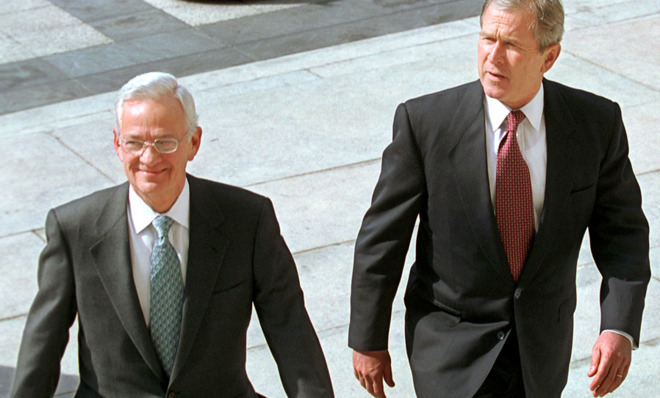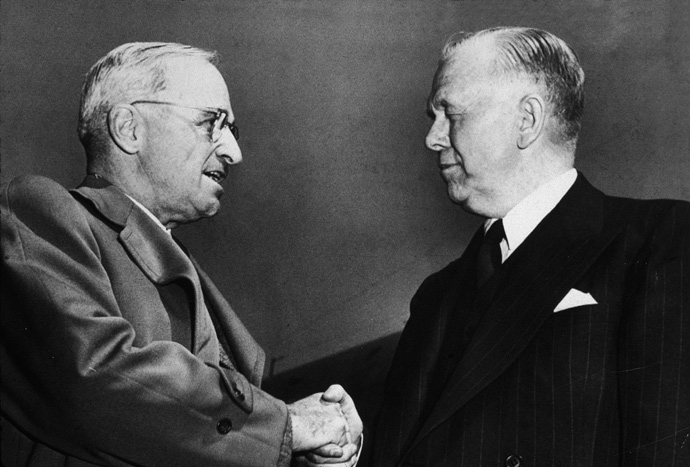Cabinet officials going rogue: A brief history
And you thought Bob Gates was mad

A free daily email with the biggest news stories of the day – and the best features from TheWeek.com
You are now subscribed
Your newsletter sign-up was successful
Washington is predictably hyperventilating about the swipes against the Obama White House delivered by his former secretary of defense in a new memoir, but the fact that a cabinet official had differences of opinion with a president is hardly a shocking development. Pick any history book about a presidential administration, and you will find loads of palace intrigue, bruised egos, grudge matches, and sharp words from those who lost internal arguments.
Furthermore, battles between presidents and cabinet members have been known to be far nastier than anything revealed by Gates.
You may recall that President George W. Bush was wounded when Treasury Secretary Paul O'Neill unloaded to reporter Ron Suskind. O'Neill accused the White House of systematically putting politics ahead of policy, revealed the blind obsession of some officials with invading Iraq, and quoted Vice President Dick Cheney defending tax cuts for the rich by saying "deficits don't matter." O'Neill's revelations became the centerpiece of Suskind's 2004 book The Price of Loyalty, which helped shape the narrative of the Bush presidency, even though it failed to derail his re-election.
The Week
Escape your echo chamber. Get the facts behind the news, plus analysis from multiple perspectives.

Sign up for The Week's Free Newsletters
From our morning news briefing to a weekly Good News Newsletter, get the best of The Week delivered directly to your inbox.
From our morning news briefing to a weekly Good News Newsletter, get the best of The Week delivered directly to your inbox.
Ronald Reagan's second term was famously hit with a double blast of vengeful books from former cabinet members. People Magazine observed at the time that "Ronald Reagan is the first president in the nation's history to suffer — while still in office — such opportunistic vivisection by former associates."
His first budget director David Stockman published The Triumph of Politics: Why The Reagan Revolution Failed in 1986, which popularized the terms "rosy scenario" and "magic asterisk" to explain how budget gimmicks were deployed to mask the failure to cut spending. Later, former Treasury Secretary and Chief of Staff Donald Regan slammed the White House in For the Record, which revealed how Nancy Reagan sought to control the White House with the help of astrology.
Indeed, fierce scraps between presidents and key cabinet officials are par for the course, if not always well known or remembered.

President Harry Truman's secretary of state, the wildly popular war hero George Marshall, told him to his face that if he recognized the new state of Israel he would vote against him for re-election, an implicit threat to sandbag his campaign. Truman was stunned, but he held firm and Marshall backed down, kept his opposition to himself, and rebuffed suggestions he should resign in protest.
A free daily email with the biggest news stories of the day – and the best features from TheWeek.com
President Franklin Delano Roosevelt had an ugly tangle with his first budget director Lewis Douglas. In 1933, Douglas, horrified by Roosevelt's plans to take American currency off the gold standard (he privately deemed it "the end of western civilization") began leaking to the press that some administration officials considered the monetary strategy to be unconstitutional. But Roosevelt thought Dean Acheson, then undersecretary of the Treasury, was the leak and fired him instead.
The following year, Douglas resigned in protest of Roosevelt's decision to increase public works spending to fight the Depression instead of ending all "emergency expenditures." Once out of the White House, Douglas publicly lashed out at the New Deal as having a "deadly parallel" to Soviet communism, and campaigned for the Republican presidential nominees in 1936 and 1940.
President Woodrow Wilson perhaps dealt with the harshest rebuke from a cabinet member when his Secretary of State William Jennings Bryan, a huge political force in the Democratic Party, resigned in protest of Wilson's handling of Germany during the run-up to World War I. Bryan proceeded to travel the countryside, rallying support against any moves toward entering the war and threatening a fatal split in the party. Yet Wilson's own barnstorming in favor of military preparedness kept the Democrats unified, allowing him to win re-election and steer Democratic Party foreign policy away from isolationism for the next 100 years.
Compared to the above, the Gates memoir — with its reported mix of praise and criticism — seems like a gentle ribbing.
More importantly, the history of cabinet tensions reminds us that the view from one cabinet member can't give a full picture of a president and an administration. It is only one account, and needs to be reconciled with several others, and assessed alongside the final outcomes of presidential policies, before it can be properly analyzed. The Gates memoir is sure to be an important artifact of the Obama historic record, but it's unlikely to be the Rosetta Stone.
Bill Scher is the executive editor of LiberalOasis.com and the online campaign manager at Campaign for America's Future. He is the author of Wait! Don't Move To Canada!: A Stay-and-Fight Strategy to Win Back America, a regular contributor to Bloggingheads.tv and host of the LiberalOasis Radio Show weekly podcast.